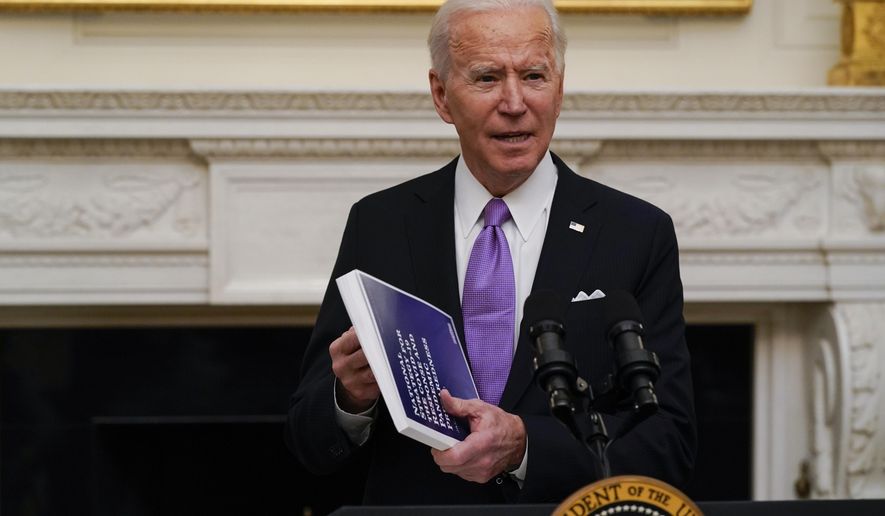President Biden plans to seek a five-year extension of a nuclear arms treaty with Russia that expires in just two weeks, one of the president’s first major foreign policy tests.
The negotiations over New START are complicated by Mr. Biden’s vows to punish Moscow for the recent SolarWinds hack and tensions with the Kremlin over meddling in the 2016 presidential race and allegations of putting bounties on U.S. troops in Afghanistan.
It presents Mr. Biden, who prides himself as a foreign policy whiz, with a difficult diplomatic needle to thread in the early days of his administration.
“The president has long been clear that the New START treaty is in the national security interest of the United States,” White House press secretary Jen Psaki said Thursday as she confirmed the five-year time frame.
Under the 10-year agreement, which took effect Feb. 5, 2011, the U.S. and Russia are limited to 700 deployed intercontinental ballistic missiles, submarine-launched ballistic missiles, and nuclear-capable heavy bombers, 1,550 nuclear warheads on deployed weapons, and 800 launchers and heavy bombers equipped for nuclear weapons.
The deal includes an option to extend the treaty for up to five years without having to consult with Congress.
Ms. Psaki said Mr. Biden is also tasking the intelligence community with conducting a full assessment of the SolarWinds hack, Russian interference in the 2020 elections, the country’s suspected use of chemical weapons against opposition leader Alexei Navalny, and alleged bounties on U.S. soldiers in Afghanistan.
“This extension makes even more sense when the relationship with Russia is adversarial, as it is at this time,” she said.
Marshall Billingslea, who was special presidential envoy for arms control under President Trump, said Mr. Biden was giving away the store with a five-year extension.
“Took just 24 hours for Biden team to squander most significant leverage we have over Russia.” Mr. Billingslea said in a post on Twitter.
Russian President Vladimir Putin had floated a short-term extension to the treaty, but negotiations with the Trump administration didn’t bear fruit.
“I think that there is pressure on both sides here to use the START treaty as a tool for engagement and for the setting of long-term strategic positions for both their countries,” said Matthew Schmidt, a national security professor at the University of New Haven.
Extending the treaty to 2026 would allow the U.S. and Russia to explore new arrangements, said Pentagon spokesman John Kirby.
“Just as we engage Russia in ways that advance American interests, we in the department will remain clear-eyed about the challenges Russia poses and committed to defending the nation against their reckless and adversarial actions,” Mr. Kirby said.
Russian Foreign Minister Sergey Lavrov said this week that Russia is prepared to strike a deal on an extension.
Part of the Trump administration’s objections to a straight extension was that Russia is building a stockpile of non-strategic nuclear weapons that aren’t covered by the deal, said Matthew Kroenig, deputy director of the Atlantic Council’s Scowcroft Center for Strategy and Security.
“So basically, any weapon system you can imagine, Russia puts a nuke on,” he said.
As Ms. Psaki indicated, coloring the negotiations is any Biden administration response to the massive SolarWinds hack of federal agencies and major U.S. companies. U.S. intelligence has officially fingered Russia as the likely culprit.
Incoming National Security Adviser Jake Sullivan signaled that this week’s arrest of Mr. Navalny, suspected of being poisoned by allies of Mr. Putin, is unacceptable.
“Mr. Navalny should be immediately released, and the perpetrators of the outrageous attack on his life must be held accountable,” he said on Twitter.
John R. Bolton, a national security adviser under Mr. Trump, said this week that Mr. Biden should shoot for a six-month extension to try to keep the heat on Moscow and include China, France and Britain in the talks.
“Is the U.S. supposed to wait until China reaches its comfort level of strategic warheads, and only then commence negotiations about reducing its capabilities?” Mr. Bolton said in a piece for The Wall Street Journal.
The Trump administration tried to loop China into the negotiations but was rebuffed.
Rapid advances in technology, research and development are also affecting the negotiations.
“Looming over all of this is the revolution in hypersonic weapons,” Mr. Schmidt said. “To some degree, the long-term interest of the United States is to get control over that and somehow fold those weapons into this treaty, which is not going to be easy to do.”
Hypersonic weapons fly at least five times the speed of sound, and experts have warned that the U.S. is falling behind China and Russia on development of the weapons.
“It’s not the 1970s anymore. Strategic nuclear weapons aren’t the only strategic weapons,” Mr. Kroenig said.
⦁ Lauren Toms contributed to this report.
• David Sherfinski can be reached at dsherfinski@washingtontimes.com.




Please read our comment policy before commenting.